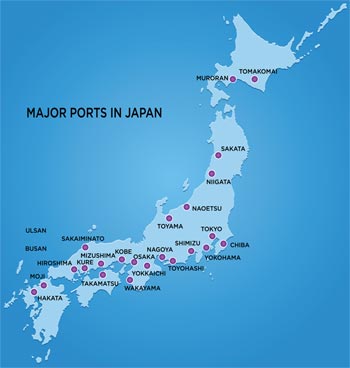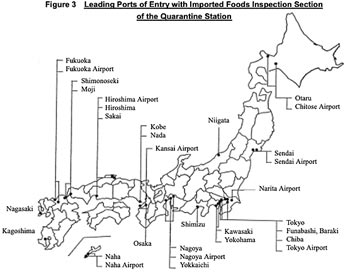What to consider when shipping from the USA to Japan?
There are five major base ports in Japan: TOKYO, YOKOHAMA, NAGOYA, KOBE and OSAKA. These five ports account for the bulk of Japan’s overall international container traffic by ocean.

Average transit time from USA to Japan by ocean:
From US West Coast (direct service)
14-20 days
From US East Coast (all water service)
30-40 days
How to select your destination port?
Always consult first with your buyer (importer and their customs broker) as some imported products, such as apparel, furniture or general merchandise, can be brought into Japan after undergoing the customs inspection at the nearest port of entry.
Note that Japan imposes restrictions on the sales or use of certain products including health-related goods such as medical products, pharmaceuticals, agricultural products and chemicals.
 If food-related items are being imported, the importer must submit a “Notification Form for Importation of Food” to the Quarantine Station. You will then be asked to ship to the designated port with a Quarantine Station where on-site inspection to verify the food poses no threat to human health can be performed.
If food-related items are being imported, the importer must submit a “Notification Form for Importation of Food” to the Quarantine Station. You will then be asked to ship to the designated port with a Quarantine Station where on-site inspection to verify the food poses no threat to human health can be performed.
Japanese Customs reviews and evaluates these types of products for import suitability before shipping to Japan. Licenses from the relevant regulatory agencies may also be required.
The use of certain chemicals, food additives and cosmetics is severely regulated. Make sure to do your research before shipping.
Tips and Tricks to Avoid Customs Delays
Always work with a trusted freight forwarder or customs specialist to ensure your shipping is done properly.
Japan’s prohibited imports include:
Understanding Japanese import requirements and documentation
Importantly, it’s important when doing business and commerce in Japan to understand import requirements and documentation such as:
We offer a wide variety of shipping services including cargo shipment by air, by ocean, logistics, oversize/project cargo, and when shipping hazardous materials to the job site. Door-to-door service is also available. For any questions, please give us a call at 888.488.4888; or email us today for help with your shipment to Japan and a free rate quote!

Average transit time from USA to Japan by ocean:
From US West Coast (direct service)
14-20 days
From US East Coast (all water service)
30-40 days
How to select your destination port?
Always consult first with your buyer (importer and their customs broker) as some imported products, such as apparel, furniture or general merchandise, can be brought into Japan after undergoing the customs inspection at the nearest port of entry.
Note that Japan imposes restrictions on the sales or use of certain products including health-related goods such as medical products, pharmaceuticals, agricultural products and chemicals.
 If food-related items are being imported, the importer must submit a “Notification Form for Importation of Food” to the Quarantine Station. You will then be asked to ship to the designated port with a Quarantine Station where on-site inspection to verify the food poses no threat to human health can be performed.
If food-related items are being imported, the importer must submit a “Notification Form for Importation of Food” to the Quarantine Station. You will then be asked to ship to the designated port with a Quarantine Station where on-site inspection to verify the food poses no threat to human health can be performed.Japanese Customs reviews and evaluates these types of products for import suitability before shipping to Japan. Licenses from the relevant regulatory agencies may also be required.
The use of certain chemicals, food additives and cosmetics is severely regulated. Make sure to do your research before shipping.
Tips and Tricks to Avoid Customs Delays
Always work with a trusted freight forwarder or customs specialist to ensure your shipping is done properly.
Japan’s prohibited imports include:
- Narcotics and related utensils
- Firearms and firearm parts including ammunition
- Explosives and gunpowder
- Precursor materials for chemical weapons, germs which are likely to be used for bio-terrorism
- Counterfeit goods or imitation coins or currency
- Obscene materials or goods that violate intellectual property rights
- Other restricted items include but are not limited to certain agricultural and meat products, endangered species and products such as ivory, animal parts and fur where trade is banned by international treaty
- Aerosols
- Chemicals
- Food additives
- Meat and fish products
- Fruit, nut and vegetable preparations
- Pharmaceuticals
- Medical devices
- Cosmetics
- Toiletries
- Toys
- Pet products
- Animal feed
- Fur
- Auto parts
- Batteries
- Personal effects and more
Understanding Japanese import requirements and documentation
Importantly, it’s important when doing business and commerce in Japan to understand import requirements and documentation such as:
- The commercial invoice should be as descriptive as possible for each line item. The packing list should always include the exact contents and measurement of each pallet/container including the gross and net weight of each item. Be specific and free of spelling errors.
- When completing customs documents, list each commodity separately, provide detailed description of each line item, including what it’s made of and how it will be used.
- Keep multiple piece shipments together, label individually and package well.
- Use heat treated pallets and wood packaging materials in compliance with ISPM 15.
- Legibly print the commodity’s country of origin/manufacturer to indicate where your cargo was manufactured, grown or produced.
- Always include contact information of the shipper and the consignee (contact person, phone number and email addresses) on your shipping documents.
- Declare the accurate value for your item, even if it’s being provided to the recipient at no charge (for example, sample or not for resale).
- Make sure information is consistent across all required customs documents.
We offer a wide variety of shipping services including cargo shipment by air, by ocean, logistics, oversize/project cargo, and when shipping hazardous materials to the job site. Door-to-door service is also available. For any questions, please give us a call at 888.488.4888; or email us today for help with your shipment to Japan and a free rate quote!